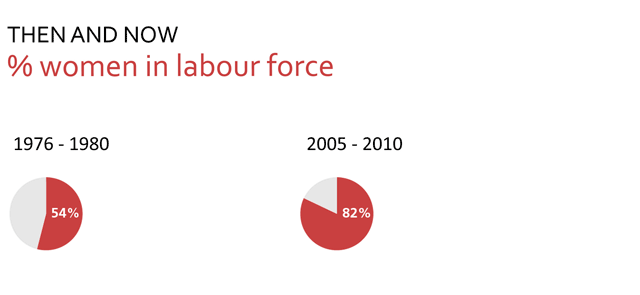A lot has happened since 1976. The Canadian economy has grown 108%, after controlling for inflation. On average, it now produces an extra $35,000 per household.
Despite this additional prosperity, a silent generational crisis occurs in homes across the land, one we neglect because Canadians are stuck in stale political debates. The crisis becomes clear when we consider a simple “Then and Now” story. Picture it: the mid-1970s in Canada. Baby Boomers were moving beyond their sex, drugs and rock and roll phase to build families, communities and enterprises. Then the average household income for a young couple was $65,360, adjusting for inflation and expressing in current dollars. 54% of young women contributed to this income.
Flash forward to the present. 82% of women now contribute income, while young men’s employment remains stable. Despite all this extra adult time in the labour market, average household income for a young couple today is $68,580, just slightly higher than 35 years earlier.
It is worrisome for a country’s standard of living when we ask a generation to make do with household incomes that flat-lined despite a dramatic increase in adult time devoted to earning. But the reality is bleaker still when we recognize that the primary cost of living – housing – has skyrocketed over the same period. In 1976, the average price for Canadian housing was $192,390, again controlling for inflation and reporting in today’s currency. Today, it is $339,045. That’s an increase of 76%.
When housing costs nearly double at the same moment that household incomes stall for a group of adults who are more committed to the labour market than any previous generation, we’re talking about a massive social and ec onomic change – one akin to a silent, but no less damaging, tectonic shift. The generation raising kids today is squeezed for time at home; they are squeezed for income even if they are not ‘poor’ because of the cost of housing; and they are squeezed for services like childcare that will help them balance successfully raising a family with earning a living. In short, this generation can no longer count on a market in which they earn and purchase a standard of living that approximates what their parents enjoyed, even though the economy has grown a rate that far outpaces (by 44%) the rate of population growth.
onomic change – one akin to a silent, but no less damaging, tectonic shift. The generation raising kids today is squeezed for time at home; they are squeezed for income even if they are not ‘poor’ because of the cost of housing; and they are squeezed for services like childcare that will help them balance successfully raising a family with earning a living. In short, this generation can no longer count on a market in which they earn and purchase a standard of living that approximates what their parents enjoyed, even though the economy has grown a rate that far outpaces (by 44%) the rate of population growth.
What accounts for the generational decline in the standard of living despite the rising Gross Domestic Product? I explore this question throughout this website, and suggest that Thinking like a beaver offers pragmatic solutions.



Hey Paul,
Thanks for saying all these things that Need to be said. Sometimes I feel like we only hear “Best Place on Earth” and “Supernatural BC” and all these stupid livability studies by some institues out of Geneva, when we really need to be seeing the numbers of how my generation (I’m 29, Born and live in Vancouver and UBC educated) are slowly getting nickel and dimed into poverty by contant inflation and stagnant salary/wage increases. Your message should serve as a wake up call to policiticans more interested in chasing foreign Idle wealth than taking care of the citizens and future citizens of BC. I’m a former student of yours and saw you on the news yesterday, congratulations on the profile you attained with your last study. I hope to see more from you in the future.
– Iain
Bleak enough when expressed in family income and expenses. Perhaps bleaker yet when expressed in family hours worked and expenses. And it would be interesting to factor in the quality of life in the workplace. Do you have suggestions as to where to look for these measurements?
Pingback: Why Québec’s Protest Movement Will Spread Across Canada | Tony Ezzy Gets a Blorg!
I’m an old guy and I don’t have to worry bout money. I paid my dues. I had a career in economics for 30 years and always marvelled at how stupid the voters in canada are. Decades of support for a lieberal party that continually bought voters with their own money. It’s no different now. Khanada is badly broken and may be unfixable. Too bad for it had some potential. I just wish the Prairie Provinces would decouple on both ends (to use a railway expression) and join the USA.
Deciding where to invest can be daunting. I explored various options for my cash but felt uncertain. Recently, I stumbled upon https://icoholder.com/ and found it to be a valuable resource for understanding different investment opportunities. It offers insights and information that helped me make informed decisions. It’s a useful platform for anyone navigating the complexities of investment choices.